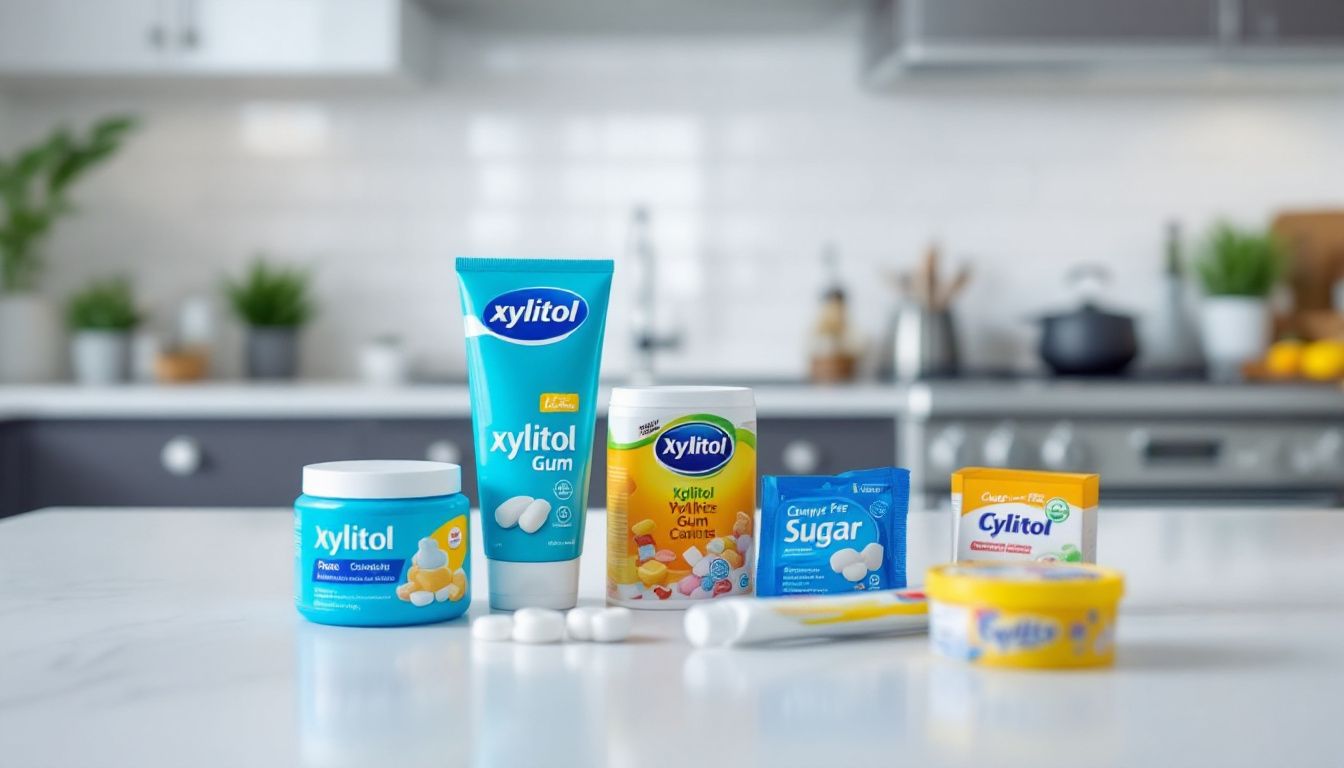Struggling to cut back on sugar but still want sweet treats? Xylitol, a natural sugar substitute, might be your answer. It’s found in products like chewing gum, toothpaste, and even sugar-free candy.
Thank you for reading this post, don't forget to subscribe!Keep reading to learn how it helps with dental health and more!
Key Takeaways
- Xylitol is a natural sugar substitute with fewer calories (2.4 per gram) than regular sugar (4 per gram). It has a low glycemic index of 7, making it safe for diabetics and keto diets.
- It improves oral health by reducing harmful bacteria and preventing tooth decay. Using 5-10 grams daily can lower dental issues like cavities by 27-75%.
- High doses may cause stomach upset or diarrhea, especially in people with IBS or FODMAP sensitivity. It’s toxic to dogs even in small amounts and can lead to liver damage or death.
- Research suggests xylitol may support bone strength by aiding calcium absorption and collagen production but needs more human studies for confirmation.
- While generally safe, some studies suggest possible heart-related risks from excessive intake, requiring cautious use until further research clarifies effects on cardiovascular health (European Heart Journal, 2024).
What is Xylitol?

Xylitol is a natural sugar substitute often found in fruits, vegetables, and certain tree fibers like birch. It belongs to the group of sugar alcohols and is commonly used in sugar-free products such as chewing gum, candies, toothpaste, and diabetes-friendly foods.
It tastes just as sweet as table sugar but with fewer calories—only 2.4 calories per gram compared to 4 calories in regular cane sugar. Xylitol also has a low glycemic index (GI) of 7, much lower than that of regular sugars which range from 60-70.
This makes it a great option for maintaining stable blood sugar levels or following a keto diet.
Health Benefits of Xylitol
Xylitol is a sugar alcohol used as a natural sugar substitute. It offers several health benefits that go beyond just sweetening food.
- Reduces tooth decay – Xylitol prevents harmful bacteria, like Streptococcus mutans, from sticking to teeth. A daily intake of 5-10 grams can help prevent dental caries and tooth decay.
- Improves oral health – Chewing gum or using toothpaste with xylitol reduces bad bacteria by 27-75%. This keeps your mouth healthy and lowers the risk of gum diseases.
- Supports calcium absorption – Some animal studies suggest xylitol may enhance calcium uptake in bones. This could help reduce osteoporosis risk over time.
- Diabetes-friendly – It has a low glycemic index (GI), so it doesn’t spike blood sugar levels. People on low-carb or keto diets can use it as a safe sweetener.
- Promotes gut health – Xylitol acts as soluble fiber in the digestive system. It supports good gut bacteria and may improve digestion.
- Aids weight management – Studies in rats show that it reduces belly fat and prevents weight gain even with high-calorie diets.
- May benefit bone health – Research hints at increased collagen production linked to xylitol consumption, which could strengthen bones over time.
- Fights ear infections – Using xylitol in oral-care products might lower rates of certain infections, such as those caused by middle-ear bacteria.
Potential Risks and Side Effects of Xylitol
Eating too much xylitol can upset your stomach. It acts as a mild laxative, leading to gas, bloating, or diarrhea. People with irritable bowel syndrome (IBS) or FODMAP sensitivity might feel worse after consuming this sugar alcohol.
Small amounts may be okay, but large doses can trigger discomfort.
This sweetener is highly toxic to dogs and even tiny amounts can harm them. Just 0.1 grams per kilogram of weight could cause low blood sugar or potentially fatal liver damage. For example, one piece of chewing gum containing xylitol could poison a 67-pound dog.
Recent studies like the one from the *European Heart Journal* in 2024 suggest possible links between high intake and heart attack risks—though more research is needed on its effects on cardiovascular health.
Always use it carefully for humans…and keep it far away from pets!
Conclusion
Xylitol is a smart choice for those wanting less sugar. It’s sweet, low in calories, and even helps with dental health. While it has many benefits, high doses can upset your stomach.
Keep xylitol out of reach of dogs—it’s dangerous for them. Adding it to your diet can support healthy habits when used wisely!
For more insights on maintaining your health with age, visit our detailed guide on nutrition and aging.
